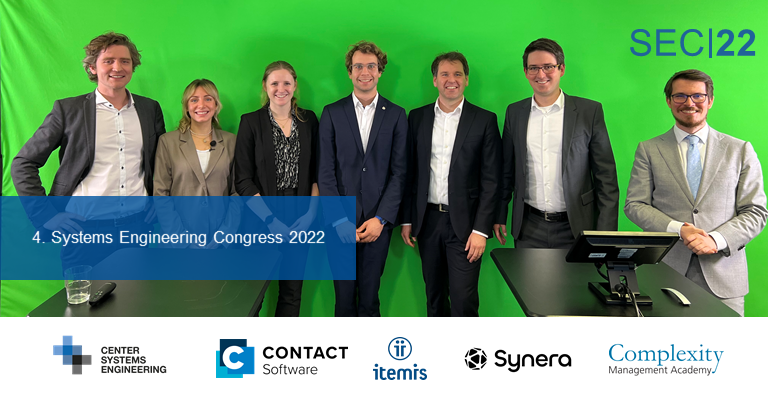22. December 2022
The Systems Engineering Congress entered its fourth round at the beginning of December and was again organised in a digital format this year. The centre directors and the initiators of the Center for Systems Engineering (CSE) Prof. Georg Jacobs, Prof. Bernhard Rumpe and Prof. Günther Schuh invited to discuss new approaches and methods of systems engineering as well as their industrial implementation and attracted company representatives from a wide range of industries to the congress.
The Campus Forum offered the approximately 200 participants and exhibitors a unique digital networking platform for the exchange of ideas, questions and innovations on current topics such as Model-based Systems Engineering, Transformation Towards Digital Engineering and Modelling Sustainability as well as Architecting Complex Systems.
The SEC offered the audience a successful and varied programme on the overarching theme of Seamless Model-based Systems Engineering with a large number of exciting presentations over two days.
The speakers came from the fields of plant and equipment engineering (Aixtron SE, Terex Deutschland GmbH, Schindler Aufzüge AG, everwave gGmbH, KION Group), the automotive industry (HELLA GmbH & Co. KGaA, Robert Bosch GmbH, Mahle GmbH), aeronautical engineering (AIRBUS), software development (itemis AG, Synera GmbH, SAP, ISG Industrielle Steuerungstechnik GmbH), engineering services (M.TEC Engineering GmbH) and wind energy technology (Vestas). The contributions from industry were complemented by contributions from academia (RWTH Aachen University), which added to the wide range of focal points to create a comprehensive overall picture of the topic.
The centre directors Dr. Michael Riesener and Dr. Joerg Berroth opened the congress from the studio of the Campus Forum on the RWTH Aachen campus and comprehensively motivated the necessity of the individual congress topics. Inspiring presentations followed on the first day on the topics of “Transformation Towards Digital Engineering”, “Model-based Systems Engineering” and “Function-oriented Engineering”. Another highlight of this day was the interesting insight into the work at the RWTH Campus through the presentation of the SE Experience Lab.
The second day of the event was followed by lectures on “Modelling Sustainablity” using the example of the chemical industry and the construction industry. Prof. Dr. Günther Schuh then opened and chaired the thematic block “Architecting Complex Systems”. Parallel presentations on the topic of “Development and Production Co-Engineering” provided inspiration. Bosch.IO GmbH concluded the second day of the event with a captivating outlook on future digital product development.
The two centre directors were very satisfied with the fourth edition of the congress:
„Due to the challenge of a digital event, we had to create new concepts for an attractive Systems Engineering Congress with the organisers. Together we managed to generate a very good interactive format despite the digital implementation. We would therefore like to thank the speakers and the event partners for the smooth running of the event.
And of course we hope to be able to welcome numerous participants to Aachen again for the 5th Systems Engineering Congress in 2023.“


